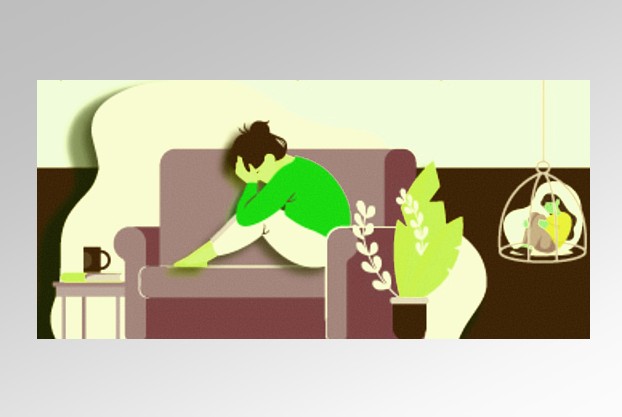You feel it, don't you? That sound in the stillness, or maybe a thunderous roar in the commotion, that sense of isolation in the crowd, and so forth!
Millions of lives are impacted by this silent epidemic, which casts a pervasive shadow. Depression and anxiety are more than just unpleasant emotions; they are powerful enemies that can rob you of your happiness, take away your tranquility, and make your world seem as small as the walls surrounding it. But you're not dreaming, and you're not alone at all.
An estimated 280 million people worldwide suffer from depression, and an additional 301 million are affected by anxiety disorders. Take a moment to consider that..
The good news? The world is finally catching up.
What if the path to reclaiming your mind, your peace, your self, was as accessible as the device you’re holding?
What if the very screens we often blame for our disconnection could actually become our most powerful conduits to healing?
Welcome to the revolution: online counselling for anxiety and depression is not just an alternative; it’s becoming the frontline, breaking down barriers and offering a beacon of hope in a world that desperately needs it.
The Unseen Epidemic: Why We're Reaching a Breaking Point
Let’s be honest. Anxiety is more than stress; it's the never-ending "what if" loop; the pounding heart, the dizzying thoughts that steal your sleep, and the paralyzing dread before a simple phone call.
Depression, too, is more than just melancholy. It's the thick, oppressive fog shrouding everything, the profound exhaustion, the apathy, and the silence where laughter once existed. It's feeling utterly overwhelmed and empty while battling a daily, lonely struggle.
The statistics are clear: access lags behind awareness. A startling 50% of people with mental health disorders do not receive treatment due to stigma, cost, or location.
Breaking the Stigma, Embracing the Screen
Earlier, going to therapy required constant juggling between travelling, work, hiding yourself from everyone and then entering secretly in a therapeutic space. It required rearranging schedules, negotiating traffic, and facing the hurdles that stigmatized online counseling for depression and anxiety as weakness. These historical obstacles were psychological as well as practical, supporting the notion that mental health issues ought to be kept under wraps.
However, what if those obstacles just…. disappeared?
Convenience from home allows you to take charge of your recovery process by being at a secure and comfortable place that you love staying at.
In this digital age, your therapist isn't across town; they’re just a click away. The need for hushed secrecy is replaced by the privacy of your own space.
Imagine this: the severe social anxiety that makes leaving the house feel impossible, or the crushing fatigue of depression that renders travel unbearable. For these individuals, the leap to in-person therapy can feel like climbing Mount Everest. This is where virtual therapy for anxiety steps in as a game-changer, dissolving monumental challenges into manageable steps.
Your Couch, Your Rules: The Core Benefits of Digital Healing
Let’s be honest: life is chaotic. Squeezing in "one more thing" often feels impossible. But what if that "one more thing" was your lifeline, and it effortlessly fit into your life? This isn't a fantasy; it's the reality of online counselling.
- Accessibility Without Boundaries: Do you live in a remote location, are confined to your home, or are you geographically separated from your ideal therapist? Geographical boundaries are eliminated by online counselling. Help is for everyone, everywhere, not just those living in urban areas.
- Comfort and Security in Your Haven: It is incredibly reassuring to talk about your worst fears while lounging on your own couch. Your house is your safe haven, a regulated setting that greatly reduces initial anxiety. This eliminates the stress of a clinical setting and allows you to fully concentrate on your recovery.
- Consistency & Flexibility to Fit Your Life: Bid farewell to fighting traffic or rushing to find childcare. Online sessions can frequently be arranged to work around your schedule. In addition to being practical, this flexibility is essential for consistency, which is necessary for significant, long-lasting change.
- Privacy & Anonymity: For many, the fear of being seen entering a therapist's office is a huge deterrent. Online counselling offers a heightened sense of privacy. You can connect from anywhere, ensuring your journey to wellness remains entirely your own business.
And if you’re wondering about efficacy, let's lay that doubt to rest. Numerous studies show that online therapy can be just as effective as in-person counselling for anxiety and depression. The quality of the therapeutic relationship, consistent engagement, and evidence-based approaches remain the same; only the delivery method has evolved. This isn't a lesser form of therapy; it's an intelligent, modern evolution.
Taking the Leap: What to Consider for in an Online Service
Are you prepared to get started? Fantastic. This is a strong move.
However, how can one find the appropriate support in the vast digital landscape? You must exercise discernment, take initiative, and make sure you're spending money on high-quality care online counselling for anxiety and depression.
Vetting Credentials & Specialization: Your therapist must be a licensed, accredited professional in your region. Look for specific experience in virtual therapy for anxiety and depression because expertise matters.
Platform Security & Confidentiality: Your sessions must be secure, encrypted, and compliant with major privacy laws (like HIPAA). Your confidentiality is non-negotiable.
The "Fit" – Try Before You Begin: The bond is everything. Take advantage of introductory calls to ensure you feel heard, understood, and genuinely connected to your therapist.
In essence, you are not alone on your difficult journey through anxiety and depression. Online counselling for anxiety and depression has revolutionized mental health services by providing a potent, easily accessible, and intensely individualized route to recovery. It demonstrates that deep healing and connection can thrive even in the digital sphere.

